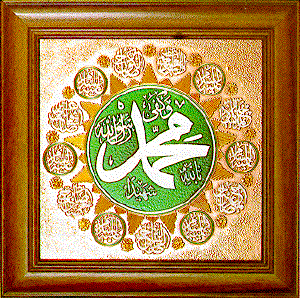
Historical Introduction to Islam

Muhammad (SAWS), in Arabic.
Muhammad
(SAWS), the prophet of Islam, was born in Makkah in the year 570 of the Common
Era. His parents were members of a branch of the Quraish tribe who governed Makkah.
His father died before his birth and his mother when he was 5 years old, and he
then became under the care of an uncle. Little is known of his life from there,
except that he was known for his honesty and was called Al Amin, that means
"the honest one".
At
the age of 25 years old he married a rich widower called Khadija. At the age of
40 Muhammad (SAWS) felt that he was chosen by God to be the prophet of a
true religion.
"There is no God except Allah, and Muhammad is
the Prophet of Allah", became the basic declaration of the Islamic
faith.
Rejected
and persecuted for the citizens of Makkah, Muhammad (SAWS) left the city in
September of 622 and ran away for Yathrib (today Madina. Those
who followed and helped him during the escape became the leaders of the Islamic
movement.
Celebrated as the Hegira (meaning escape or immigration), this event marks
the start of
the Islamic calendar. It is from this time the written
Constitution, the first one of the sort in the world, that determined the rights
and duties of the citizens, the head and the State, besides establishing rules
of external politics.
The new religious and mainly legal rules had abolished the tribal traditions, among them the vendetta, although keeping some pre-Islamic practices, under the concepts of the new rules. In this maintenance, we can see some aspects of the marriage and the private property.
The duties of the State are in four: executive, civil and military; the legislative one; judiciary
and the cultural
one. The Executive, according to Muslim authors, has the sovereignty in the hands of God, the Qur’an,
that is the source of the law. The Judiciary determines the equality
between men
before the law and in case of conflicting rules special disposals decide the difficulty
in the choice of the law to be executed. In the case of the form of
government, for being
considered divine in the application of the law, it accepted all elective as
valid ones.
Text
by Maria
C. Moreira
& Márcia Vianna Gaspar.